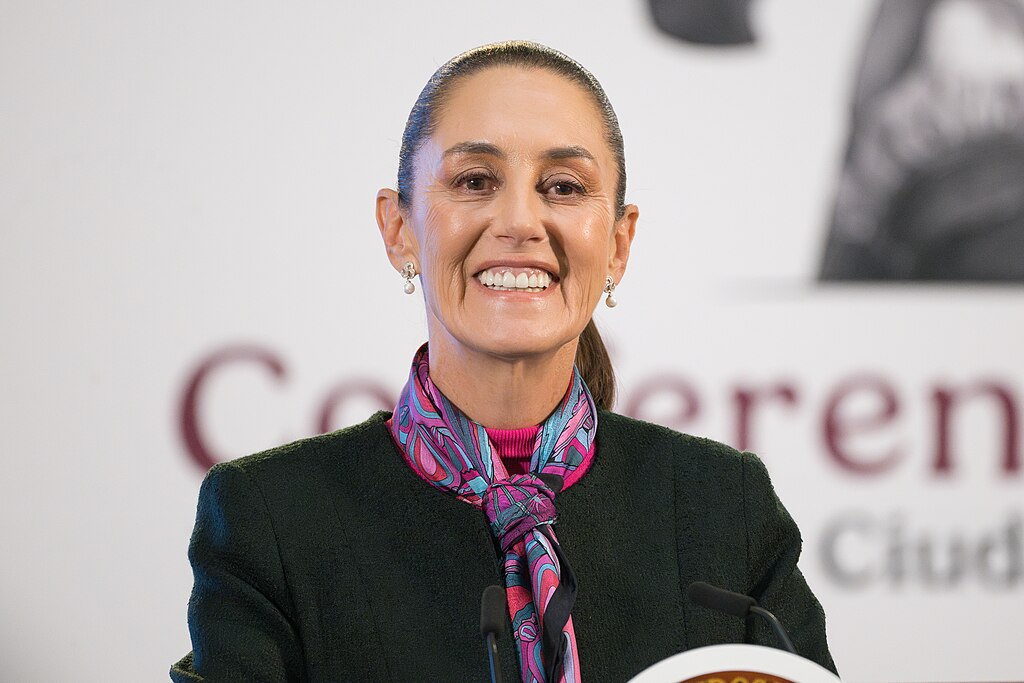Mexican President Claudia Sheinbaum successfully navigated a major foreign policy challenge, securing a 30-day pause on U.S. tariffs after negotiations with President Donald Trump. The threatened 25% tariffs, aimed at curbing fentanyl trafficking and illegal migration, posed a serious economic risk to Mexico.
Sheinbaum’s strategic and measured response has been widely praised. Former Ambassador Jorge Guajardo called her handling of the situation “masterful,” while Lila Abed of the Wilson Center highlighted Mexico’s record fentanyl seizures as a key factor in securing the agreement. Unlike Canada’s Justin Trudeau, who announced retaliatory tariffs, Sheinbaum kept a diplomatic stance while warning of countermeasures.
Sheinbaum's approach has bolstered her popularity, with her approval rating rising to 77% since November. Many feared she would struggle in negotiations with Trump, but her ability to defend the North American trade pact reassured both her electoral base and private sector leaders. While the tariff pause is a temporary win, experts caution that Sheinbaum must deliver swift results on security and migration to maintain the agreement.
Her administration's emphasis on Mexican sovereignty and economic resilience has resonated with both supporters and opposition figures. Political scientist Denise Dresser noted that Mexico is not out of the woods yet, as future tariffs remain a possibility. However, Sheinbaum’s careful strategy has positioned her as a strong negotiator on the world stage.
With the U.S. election looming, Sheinbaum's diplomatic success may shape Mexico’s trade and security relations in the coming months.



 New York Legalizes Medical Aid in Dying for Terminally Ill Patients
New York Legalizes Medical Aid in Dying for Terminally Ill Patients  China Warns US Arms Sales to Taiwan Could Disrupt Trump’s Planned Visit
China Warns US Arms Sales to Taiwan Could Disrupt Trump’s Planned Visit  Jack Lang Resigns as Head of Arab World Institute Amid Epstein Controversy
Jack Lang Resigns as Head of Arab World Institute Amid Epstein Controversy  Trump Lifts 25% Tariff on Indian Goods in Strategic U.S.–India Trade and Energy Deal
Trump Lifts 25% Tariff on Indian Goods in Strategic U.S.–India Trade and Energy Deal  South Korea Assures U.S. on Trade Deal Commitments Amid Tariff Concerns
South Korea Assures U.S. on Trade Deal Commitments Amid Tariff Concerns  U.S. to Begin Paying UN Dues as Financial Crisis Spurs Push for Reforms
U.S. to Begin Paying UN Dues as Financial Crisis Spurs Push for Reforms  U.S. Announces Additional $6 Million in Humanitarian Aid to Cuba Amid Oil Sanctions and Fuel Shortages
U.S. Announces Additional $6 Million in Humanitarian Aid to Cuba Amid Oil Sanctions and Fuel Shortages  Trump’s Inflation Claims Clash With Voters’ Cost-of-Living Reality
Trump’s Inflation Claims Clash With Voters’ Cost-of-Living Reality  U.S. Lawmakers to Review Unredacted Jeffrey Epstein DOJ Files Starting Monday
U.S. Lawmakers to Review Unredacted Jeffrey Epstein DOJ Files Starting Monday  Federal Judge Restores Funding for Gateway Rail Tunnel Project
Federal Judge Restores Funding for Gateway Rail Tunnel Project  Pentagon Ends Military Education Programs With Harvard University
Pentagon Ends Military Education Programs With Harvard University  Japan Election 2026: Sanae Takaichi Poised for Landslide Win Despite Record Snowfall
Japan Election 2026: Sanae Takaichi Poised for Landslide Win Despite Record Snowfall  India–U.S. Interim Trade Pact Cuts Auto Tariffs but Leaves Tesla Out
India–U.S. Interim Trade Pact Cuts Auto Tariffs but Leaves Tesla Out  Ohio Man Indicted for Alleged Threat Against Vice President JD Vance, Faces Additional Federal Charges
Ohio Man Indicted for Alleged Threat Against Vice President JD Vance, Faces Additional Federal Charges  Iran–U.S. Nuclear Talks in Oman Face Major Hurdles Amid Rising Regional Tensions
Iran–U.S. Nuclear Talks in Oman Face Major Hurdles Amid Rising Regional Tensions  US Pushes Ukraine-Russia Peace Talks Before Summer Amid Escalating Attacks
US Pushes Ukraine-Russia Peace Talks Before Summer Amid Escalating Attacks 































